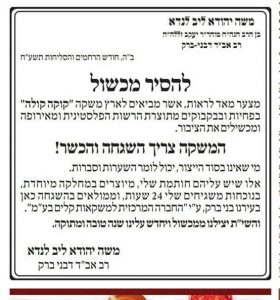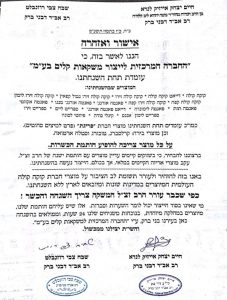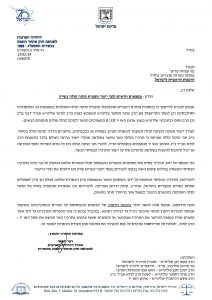
Question:
We were flying on a class trip from Europe to the USA and were offered by the flight attendants what seemed to be a European or perhaps Turkish brand of Coca-Cola which does not have the OU symbol or any other Kosher symbol on it. So my friend said that Coca-Cola is kosher in the whole world and does not need to have a kosher symbol on it for certification. I was not so sure, as I told them that if it didn’t need a certification then why do some bottles have it. Can you please clarify this matter
Answer:
*It is beyond the scope of this article to delve into the Halachic discussion surrounding trace ingredients, such as glycerin, and whether they are nullified in 60 times, and the below follows the generally accepted approach of even non-Mehadrin Hashgacha organizations to be stringent in these matters, and convey to the public the status of the Coca-Cola beverage based on these accepted Halachic positions. This does not come to negate the argument that some Rabbanim may make that Coca Cola does not need a Hashgacha anywhere due to various Halachic leniency’s which they hold as valid, contrary to the accepted approach in the Kashrus industry today.
As per the directives of the OU, Rav Landau, and chief rabbinate of Israel, the Coca-Cola beverage should only be consumed if it is manufactured in the USA and contains a kosher symbol of the OU, or is manufactured in Israel and contains a kosher symbol of Rav Landau. Coca-Cola beverages that do not have a kosher symbol on their can or bottle mainly due to being produced outside of Israel and the USA, such as Turkey and Europe and Mexico and China, should not be consumed.
Unfortunately, even if there is a rabbinical certification on the Coca-Cola beverage that is not of the OU or Rav Landa, then if it is produced outside of Israel, USA, Canada, or South Africa, then as per the directives of the above Hashgacha organizations, it should not be relied upon and hence should not be consumed. The reason for this is because the concentrate juice that is mixed into the beverage is not under any Hashgacha other than the OU and Rav Landau and this concentrated juice which is certified as kosher is not provided to bottling companies outside the above listed, and hence even if the bottling plant is under rabbinical supervision, this Coca-Cola beverage runs the risk of containing non-kosher trace ingredients [i.e. Chomrei Gelem, such as animal based glycerin, non-Kosher caramel] within the concentrated juice that is used to make it to which the Hashagach has no access to. The notion that some have that since the beverage is certified as kosher in Israel and the USA it is therefore kosher everywhere [as certainly they do not change the ingredients of how it is made between countries] is inaccurate, as indeed the ingredients of Coca-Cola for the kosher production line in Israel and USA are unique for kosher certification, and the Coca-Cola Company as well as the above Hashgacha agencies cannot guarantee at all that only the kosher ingredients will be used in other production lines in other countries which cater to the non-kosher market. While certainly one cannot say that it is not kosher without a kosher symbol, one also cannot certainly say that is kosher as the fact is that nobody knows what ingredients it truly has, and hence every God-fearing Jew should avoid its consumption. In this regard it is no different or by any other processed beverage without a rabbinical supervision which runs the risk of containing non-kosher ingredients.
Explanation: Coca-Cola is no different than any other processed beverage, which is required to have a kosher certification to make sure that all of its ingredients come from kosher sources. Due to the complexity of food manufacturing in today’s times, and the possibility of hundreds of sources being used for ingredients of a beverage, simply reading a label does not suffice, and a Hashgacha company must personally review the entire ingredient list of a product to verify and certify it as kosher. In fact, initially when Coca-Cola was first approached in 1922 by the local Atlanta rabbi, Tuvia Geffen, regarding verifying if its ingredients are kosher, it was discovered that it contained glycerin which is an animal-based product which is under debate as to its Kashrus status with many of the Poskim ruling that it retains its non-kosher status just like the non-kosher meat from which it derives. He famously became the first known individual outside of the Coca-Cola Corporation to have the full ingredient list shared with him and hence discovered its non-kosher ingredient. Rav Geffen leaned towards the approach that this ingredient of glycerin is indeed not kosher and that it is likewise not nullified in 60 times being that it is an intentional ingredient, as indeed rule many of the Poskim. As a result of his ruling and in order to broaden the market of Coca-Cola to the kosher consuming public, the Coca-Cola Company agreed to stop using the non-kosher glycerin in the beverage and switch it for a kosher version which was derived from cottonseed oil. The Coca-Cola Company eventually invested in the creation of a separate piping line for producing the kosher glycerin so it does not go through the same piping used for the manufacturing of the non-kosher glycerin and hence enter the question of absorption of non-kosher glycerin. Hence, the kosher market in the United States influenced a change of ingredients within the Coca-Cola beverage.
Now, as for today, the OU certification in the USA and Rabbanut & Landa certifications in Israel, continue to supervise that indeed only the kosher ingredient recipe version is used. [Both Rabbi Landa OBM and then chief rabbi of Israel Avraham Shapiro had the full ingredient list of Coca-Cola shared with them, and hence joined the very select few individuals who hold this formula secret, for the purpose of establishing a kosher version of the beverage.] However, there is no guarantee that other Coca-Cola manufacturing and bottling sites will likewise go out of their way to use only the kosher alternatives which sometimes is more expensive or hard to get their hands on. And here is where some confusion steps in: You see, while it is possible for local Hashgacha organizations and local Rabbanim in various other Coca-Cola production centers outside the US and Israel to supervise the bottling process of the beverage and grant it a certification, the total list of raw ingredients and chemicals used for the production is not shared with them as these materials are not produced in these bottling centers but are rather shipped to them from elsewhere. As Coca-Cola clearly writes on its website and as testified by a representative of the company as well as the OU, Rav Landa, and chief rabbinate of Israel, the primary way that Coca-Cola is produced in its global market is through a concentrated syrup which is shipped and provided to its various bottling companies. Now, as per the testimonies of all the above individuals, Coca-Cola does not have one unique recipe for its concentrate that is used globally, and its ingredients is bound to change due to financial reasons and reasons of regional ingredient availability, and at times its ingredients may contain non-kosher elements. Only the concentrated juice that is under the supervision of the OU and Rav landa have a constant guarantee that it will not include any non-kosher ingredients. These kosher concentrated juices of Coca-Cola under the above Hashgachas are only manufactured in three production sites worldwide. As per the testimony of the official Coca-Cola representative to the chief rabbinate of Israel, all other production sites of the Coca-Cola concentrate contain no Hashgacha, and no rabbi has been granted access to their ingredient list, or to the production site to supervise its Kashrus. According to this testimony, not only is the consumption of Coca-Cola beverages that do not contain a kosher certification problematic, but it furthermore questions the basis on which it is permitted to consume even those Coca-Cola beverages who carry local Hashgacha’s other than the OU and Rav Landa, as these Hashgachas have no access to the concentrate ingredients that are used. Furthermore, the company representative testifies that the kosher concentrate juice under the OU and Rav Landa is only shipped and provided to bottling companies in Israel, US, Canada, and South Africa under unique contract agreement, and hence Coca-Cola bottling companies in other countries that are under other Hashgacha’s will not have access to this kosher concentrate to use for their beverage. Accordingly, there is no guarantee that these other bottling companies are using a similar kosher formula as made in the US and Israel, and rather may be using non-kosher ingredients to make the formula simply. Now, as for the question of how a Kashrus organization can certify the beverage is kosher or list it on its kosher list, perhaps this is due to reliance on various debatable Halachic leniency’s which permit the concentrate to be consumed, such as Bittul Beshishim, and the status of the non-kosher ingredient of glycerin, and the like.
To give a case study of where a mistaken kosher certification was given to a Coca-Cola bottling site outside of the above countries we need to look no further than the Israeli rabbinates certification of Eastern European produced Coca-Cola which they certified as kosher to be imported and sold in Israel based on the fact that a recognized Kashrus organization supervised the production plants. They later retracted this certification from the Kashrus organization, when they became aware that the Kashrus organization had no supervision over the concentrated syrup, and could not provide proof that its ingredients are kosher.
Sources: See Sefer Koshros Volume 3 for a full article on the subject; For the first and original response on the subject of Coca-Cola by Rav Tuvia Gefen, see: Karnei Hod p. 244; Regarding if an intentional Issur ingredient is ever nullified, see: Stringent: Admur 442:6; Kuntrus Achron 442:5 in name of Rashba and that in Y.D. everyone agrees to him; M”A 442:1 in name of Rashba; Beis Yosef end of 134 in name of Rashba and Raavad; Rashba 3:214; Tashbeitz 3:10; Birkeiy Yosef Y.D. 134 Shiyurei Bracha 4; Divrei Chaim Y.D. 2:53; Maharam Shick O.C. 9; Imrei Eish Y.D. 1:42; Avnei Tzedek O.C. 51; Sdei Chemed Vol. 1 Mareches Alef 360; Arugas Habosem 15; Atzei Halevanos Y.D. 43; Tiferes Shmuel 17; Rav Tuvia Gefen in Karnei Hod p. 24 regarding Coca Cola Other opinions: Some Poskim rule that even intentional ingredients are nullified in 60x. [Rambam Machalos Assuros 3:13; Riy Migash in Avoda Zara 13b; Noda Beyehuda Tinyana Y.D. 56-57; Pischeiy Teshuvah Y.D. 134:8; Gilyon Mahrsha 138] See on the Coca-Cola website regarding how their international business operates and how their products are manufactured in coalition with local bottling companies worldwide: The Coca-Cola System (coca-colacompany.com)
See the following statement from the Orthodox Union given on June 12, 2013 regarding the status of Coca-Cola:
The Orthodox Union wishes to bring to your attention the following points of information:
- The OU certifies a wide range of products manufactured by The Coca-Cola Company in the United States of America, Canada and the State of Israel.
- The Orthodox Union has no information on products of The Coca-Cola Company manufactured in other locations.
- Bottled and canned products of The Coca-Cola Company in the U.S.A bear the OU logo. In the rare event that a purchased bottle or can of any product of The Coca-Cola Company does not have the OU symbol on the cap or the label or for information on any specific Fountain product please contact the Orthodox Union Consumer Hotline at 212-613-8241 or email kosherq@ou.org.





Leave A Comment?
You must be logged in to post a comment.